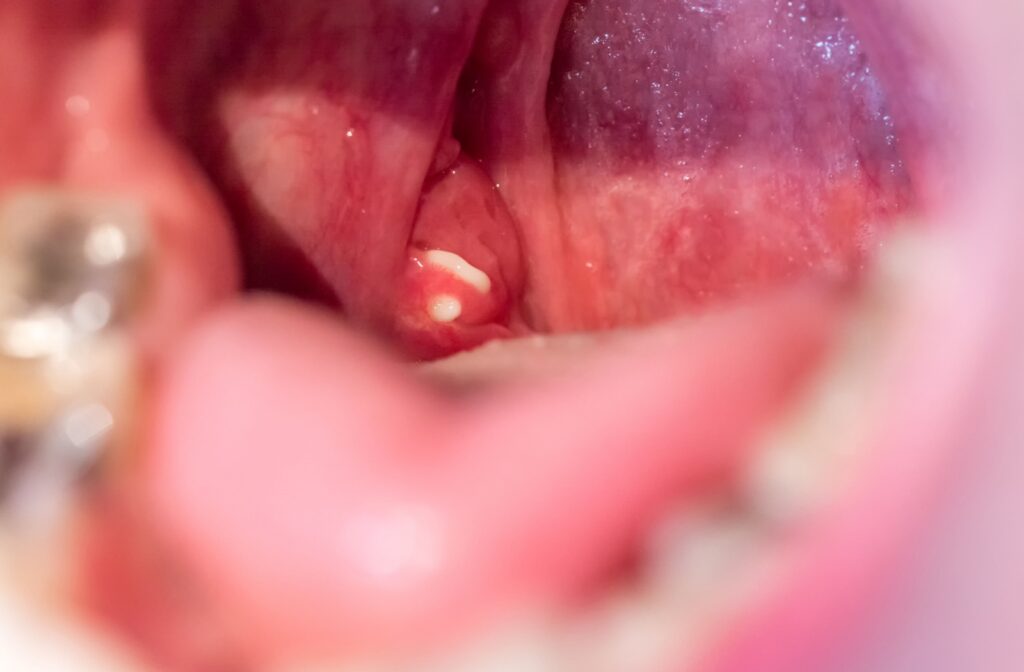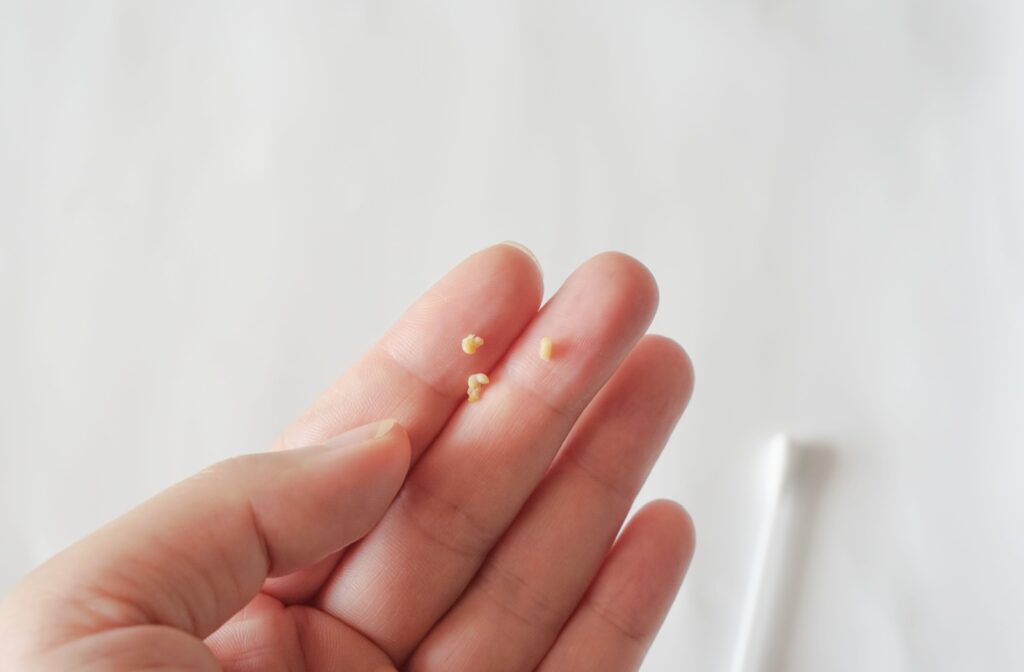It can be worrying to notice small white or yellow spots at the back of your throat. These are likely tonsil stones, which form in the nooks and crannies of your tonsils. They can feel strange, but it helps to know that many people get them without even knowing it. Understanding what they are and when a dentist can help can ease your concerns.
Yes, tonsil stones are quite common and usually not a cause for serious concern. They are a normal, though sometimes annoying, occurrence for many people. Understanding what they are can help you manage them and maintain your oral health.
What Are Tonsil Stones & How Do They Form?
Your tonsils are two small pads of tissue at the back of your throat that are part of your immune system. They help filter out germs, but their structure has small pockets and crevices. This is where the story of tonsil stones begins.
Tonsil Crevices & Debris
Tonsil stones form when tiny particles—like food, mucus, and bacteria—get trapped in these small pockets, or crypts. Over time, this collection of debris can harden into a calcified lump. This is what creates the small, hard stone you might feel or see.
What They Look Like
Most tonsil stones appear as small white or yellow pebbles on the surface of your tonsils. You might see them when you look in the mirror with your mouth open wide. Sometimes, they form deeper in the tonsil tissue, so you might not be able to see them at all.
Signs & Symptoms of Tonsil Stones
While many tonsil stones cause no symptoms, some can be a bit of a nuisance. You might experience a few different signs that point to their presence. If you notice any of these, it could be due to a tonsil stone.
- Bad breath
- A feeling that something is stuck in your throat
- A sore throat or irritation
- Visible white specks on your tonsils
- Ear pain
Because these symptoms can be linked to other oral health issues, a visit with your dentist can help find the cause and give you peace of mind.
A routine check-up is a good opportunity to discuss any concerns.
Why Tonsil Stones Come Back
If you find that tonsil stones are a regular occurrence for you, there are a few common reasons this might happen. Certain factors can make you more likely to develop them repeatedly. Your oral anatomy and health history can play a role.
Large Tonsils
If you naturally have larger tonsils, there is more surface area with more crypts where debris can collect. This simply creates more opportunities for tonsil stones to form. While you can’t change the size of your tonsils, knowing this can help you understand why tonsil stones keep happening, and when to get support.
Frequent Tonsillitis
A history of tonsil infections can also contribute to the problem. Each time your tonsils become inflamed, the crypts can grow deeper. This creates even more space for particles to get trapped and harden into stones.
Oral Hygiene Habits
Your daily oral hygiene routine is very important for prevention. Without regular brushing and flossing, more bacteria and food particles are available to build up in your tonsil crypts. A consistent teeth cleaning schedule helps manage bacteria levels throughout your mouth.

At-Home Care & Prevention Tips
Most tonsil stones can be managed at home without much trouble. In many cases, they even fall out on their own while you eat or drink. Even if a stone comes loose while eating or drinking, it isn’t harmful. Still, there are simple ways you can manage and prevent them at home.
Remove Tonsil Stones at Home
- Gargle with warm salt water—this can help dislodge stones and soothe any throat irritation.
- Use a cotton swab to gently press on the tissue around the stone, which may help it pop out.
- Try a water irrigator on a low-pressure setting to help flush debris from the tonsil crypts.
Prevent Tonsil Stones
Good oral hygiene is your first line of defence against the buildup that causes tonsil stones. A clean mouth has less debris available to get trapped. These simple habits can make a difference.
- Brush your teeth twice a day and after meals.
- Floss every day to remove trapped food particles from between your teeth.
- Gently brush your tongue to reduce bacteria in your mouth.
- Drink plenty of water to stay hydrated and help rinse your mouth and throat.
When to Talk to a Professional
While home care is often enough, there are times when it’s a good idea to seek professional advice. If stones are large, painful, or causing persistent problems, a conversation with a health professional is a good next step. You don’t have to manage discomfort on your own.
Persistent Symptoms
If you have tonsil stones that keep coming back or cause chronic discomfort, it’s time to talk to a professional. A visit to your dentist can help rule out other oral health issues that could contribute to your symptoms, which is why a full dental exam is so valuable.
Professional Options
For very bothersome cases, procedures are available to help. Options exist that can smooth out the surface of the tonsils to prevent debris from getting trapped. In some cases, a tonsillectomy—or removal of the tonsils—is a permanent solution for those with recurring issues.
Find Support for Your Oral Health at Genesis Dental
Tonsil stones are common, but that doesn’t mean you need to live with discomfort or bad breath. Simple changes at home and consistent dental care can go a long way in keeping your mouth healthy and reducing the bacteria that cause stones.
At Genesis Dental in Surrey, our team can check your tonsils during routine visits, answer your questions, and recommend safe, effective ways to manage recurring issues. You don’t have to figure it out on your own.
If you’ve noticed persistent symptoms or want peace of mind about your oral health, we’re here to help. Book your next appointment today and take the first step toward a healthier, fresher smile.




